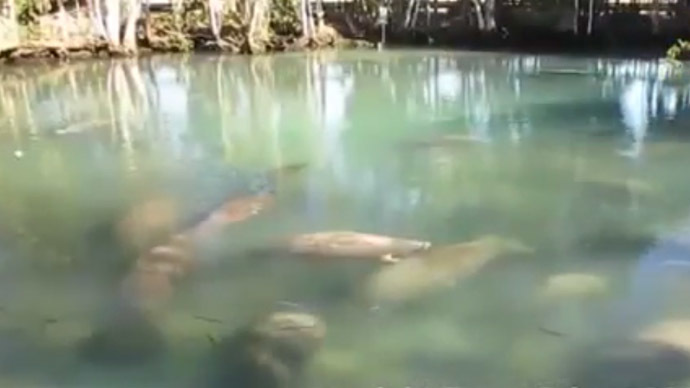Nearly 300 manatees invade Florida wildlife park, shut it down (VIDEO)

Hundreds of manatees took over a wildlife park on Florida’s gulf coast on Tuesday, forcing officials to close the area to swimmers and kayakers alike.
It is not unusual for manatees to seek shallow waters in order to stay warm when the temperature drops, but a week ago this habit was displayed to excess when 220 manatees arrived at the Three Sisters Spring – a 1 acre spring on the Gulf Coast of Florida. Due to a high tide, nearly a hundred more arrived on Monday and Tuesday, startling wildlife park officials and causing them to close the park. The spring’s central pool, which usually accommodates 65 manatees, was swamped by the arrival of about 300 of the mammals.
“We have a record number this year,” Laura Ruettiman, an environmental education guide at the Spring, told USA Today. “We have 150 more manatees here than have ever been recorded in the past.”
Florida manatees flock to the balmy waters of Three Sisters Springs when temperatures fall below 68 degree Fahrenheit (20 degrees Celsius), but their numbers are far bigger this year. The wild animals, measuring 13 foot and weighing as much 1,200 pounds (550 kilograms), draw crowds of snorkelers and kayakers – and people can even swim with the endangered species.
READ MORE: Animals in France finally recognized as ‘living, sentient beings’
However, the overcrowding for both humans and animals is causing wildlife regulators to think about creating people-free zones to protect the “sea cow,” and proposed limitations are awaiting approval by the US Fish and Wildlife Service.
“We’ve got more people. We’ve got more manatees. What we don’t have is more space,” Michael Birns, president of the Manatee Eco Tourism Association of Citrus County, told Reuters.
READ MORE:Dinosaurs wiped out by ‘nuclear winter’ effect, not firestorm after asteroid – study
Officials will monitor the pools to see whether the waterway can be opened again soon, according to the Southwest Florida Water Management District.
MT @SWFWMD: Citrus County shattered a record yesterday, with 797 manatees, 140 more than the record. pic.twitter.com/S2iNXXtypT
— MyFWC Life (@MyFWClife) February 3, 2015












